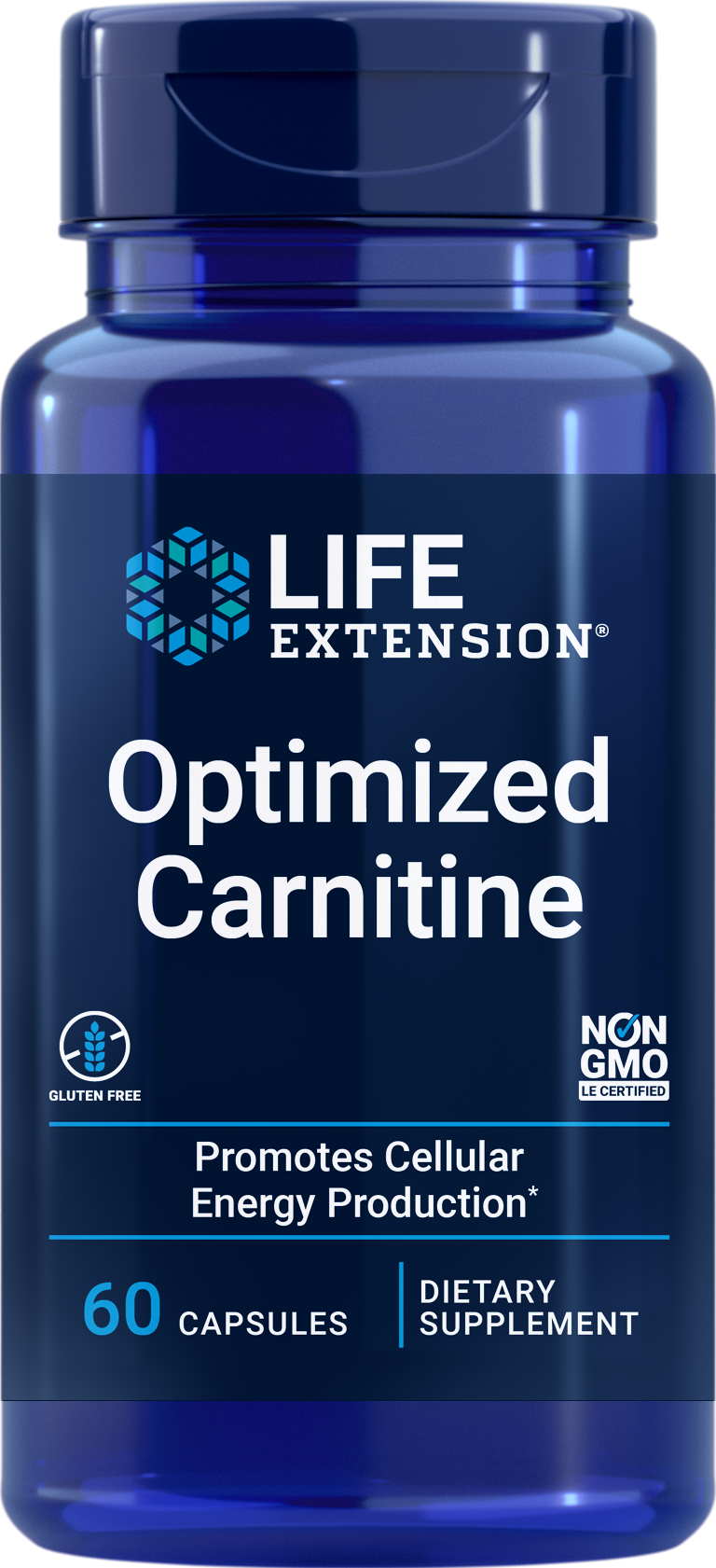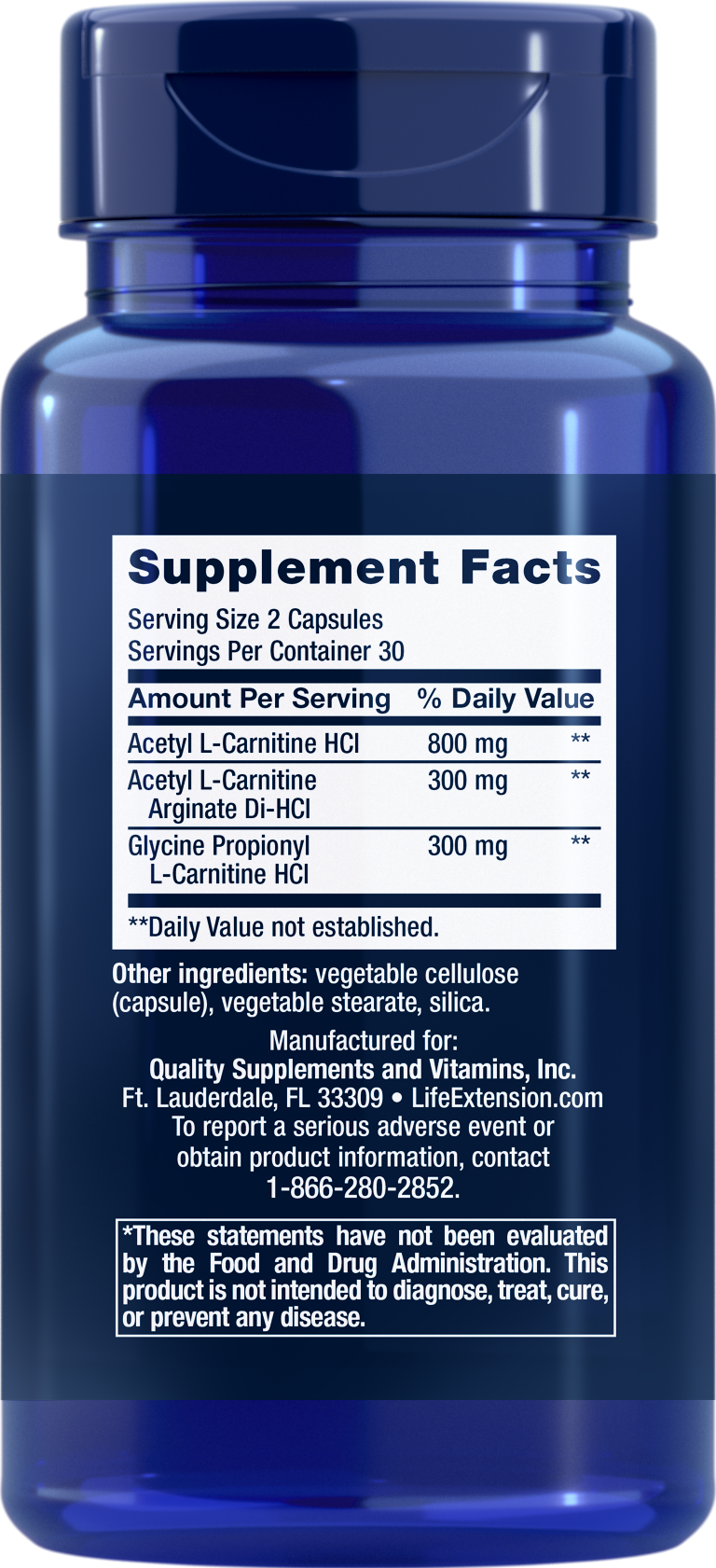Optimized Carnitine
Promotes heart and brain health
Optimized Carnitine
Promotes heart and brain health
For you, if you want to promote heart and brain health
The Optimized Carnitine with Glycocarn formula can:
- Promote energy production in the brain and central nervous system
- Promote the growth of neurites that facilitate communication between nerve cells
- Offer a combination of three advanced forms of carnitine
Optimized forms of carnitine, an amino acid derivative, assist in the process of turning fat into energy. This boost to cellular function can lead to faster recovery after exercise, and less muscle fatigue during exercise. They may also benefit your brain, heart, and central nervous system.
- Netherlands

on orders over € 69
We have a 100 days return policy, not the standard 30 days!
Order before 11:00 CET, for same day shipping (Mon-Fri)
We can help you in 6 languages
Carnitine, a derivative of amino acids, is found in nearly all body cells. Its main role is to turn fat into energy. Under normal circumstances it is produced by our bodies. However, not all of us produce the right quantities and that becomes especially meaningful as we reach an older age. Ageing causes a decline in the production of cell energy.
To slower this process, Life Extension has developed products with optimised forms of carnitine that assist in the process of turning fat into energy more rapidly. As a result, you enjoy a quicker recovery after exercise and muscle fatigue lessens. Aside from muscles, brain and heart benefit just as well. Optimised Carnitine with GlycoCarn® combines the following advanced forms of carnitine in one single formula for the benefit of your energy input:
- Acetyl-L-Carnitine- promoting energy production in the brain and central nervous system. It also supports the release and synthesis of acetylcholine, as well as enhances the release of dopamine from neurons and helps it bind to dopamine receptors.
- ArginoCarn - a patented form of acetyl-L-carnitine arginate dihydrochloride, that is molecularly bonded to the amino acid arginine, also known as the AminoCarnitine generation. Cell studies suggest that it can promote the growth of neurites that facilitate communication between nerve cells.
- Glycine Propionyl-L-Carnitine Hydrochloride (GlycoCarn®) - a patented form of AminoCarnitine that is molecularly bonded to the amino acid glycine, one of the precursor amino acids to carnitine biosynthesis. This form offers wide benefits, such as enhanced fatty acid metabolism, antioxidant activity and increased nitric oxide production. Recent research also indicates support for those involved in sports activities.
Serving size 2 vegetarian capsules
Servings per container 30
Amount per serving:
| Acetyl L-Carnitine HCl | 800 mg |
| Acetyl L-Carnitine Arginate Di-HCl | 300 mg |
| Glycine Propionyl L-Carnitine HCl | 300 mg |
Other Ingredients: vegetable cellulose (capsule), vegetable stearate, silica.
Non-GMO
Dosage and use:
Take two (2) capsules once or twice daily, or as recommended by a healthcare practitioner.
This product can be taken on an empty stomach with water or juice in the morning in divided doses or all at once.
Warnings:
Keep out of reach of children.
Do not exceed recommended dose.
Do not purchase if outer seal is broken or damaged.
If you are undergoing treatment for a medical condition or if you are pregnant or lactating, please consult with your medical practitioner first.
A food supplement should not be used as a substitute for a varied and balanced diet and a healthy lifestyle. Store tightly closed in a cool, dry place.
- Curr Drug Metab. 2011;12(7):667-678.
- Ann N Y Acad Sci. 2004;1033(1):30-41.
- Neurochem Res. 2017;42(6):1661-1675.
- Expert Rev Neurother.2013;13(8):925-936.
- Rejuvenation Res.2011;14(6):669-679.
- Ann N Y Acad Sci.2004;1033(1):108-116.
- J Neurosci Res. 1991;30(3):555-559.
- Proc Natl Acad Sci U S A.2018;115(34):8627-8632.
- Psychopharmacology. 2004;176(3):296-304.
- Scand J Gastroenterol.2011;46(6):750-759.
- Neurochem Res. 1995;20(1):1-9.
- Cardiovasc Drugs Ther. 1991;5 Suppl 1:97-105.
- Life Sciences. 2005;77(17):2082-2097.
- Free Radic Res.2007;41(8):884-891.
- Drugs R D. 2008;9(2):83-91.
- PloS one. 2015;10(10):e0140697-e0140697.
- Vascul Pharmacol.2013;59(3):76-82.
- J Am Coll Cardiol. 1995;26(6):1411-1416.
- Urology. 2005;66(5):1080-1085.
- Psychosom Med. 2004;66(2): 276-282.



